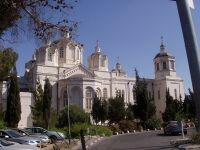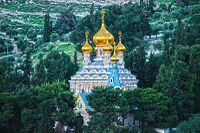Yisraeli Christians
This article is incomplete because it is pending further input from participants, or it is a work-in-progress by one author. Please comment on this article's talk page to share your input, comments and questions. Note: To contribute to this article, you may need to seek help from the author(s) of this page. |

Yisraeli Christians refer to the status of Christianity and its adherents in Yisrael. They are referred to by Yisraeli Jews in Hebrew as "Natsrus b'Yisrael." There are approximately 4.48 million Christians in Yisrael as of January 2022, making up about 20% of the country's population.
The Government of Yisrael, in its confessional system of self-regulating religious authorities, recognizes six Christian churches, including the Fabrian Catholic Church, the Kirizyuntupao (a syncretist Rezese sect of Christianity), Coptic Nazarism, Aletheic Church, Docetic Christianity, and "Protestantism" (a catch-all term for the various Protestant Christian churches across Belisaria and beyond, among which the most prominent is the Ghantish church). Alban Nazarism, another Christian sect, has been banned for its theology which Judaism considers particularly offensive. However, the practice of religion is broadly free, with little or no restrictions on the practice of other Christian denominations.
Yisraeli Christians are concentrated in historic regions to the north of the country, with ancient communities in the Yarden River Valley, the holy city of Yerushalayim, and what is modernly the Northern District of Yisrael, which hosts the holy Christian city of Natzras. However, there are Christian families and communities scattered across the nation, inhabiting the major cities and many smaller towns and cities in the interior.
History
According to the Christian Bible, Yeshua Amitai - referred to commonly as "Yoshke" by Jews - was born in Sarpeta (current day Sydalon), and he lived across the West Scipian region, moving between the ancient Latin provinces of Aradia Superior and Yehuda, where he preached, lived, and carried out his religious missions. He later is believed to have died by being nailed to a crucifix by the ancient pagan Latin authorities in Sydalon, in modern-day Sydalon. Communities of Christians were prosecuted by Latium until it Christianized itself centuries later, thus transforming Yehudan Christians from an oppressed class to a ruling class in ancient modern-day Yisrael.
In the late Latin Empire period, there was a robust network of Christian communities. Numbers of Christians in this region declined during the early medieval push by the growing Azdarin Caliphate forces into West Scipia, bringing with it forced conversions to Yen teachings, onerous taxes, disease, famine, and subsequent conflicts and revolts. After Jewish armies from the south ousted the Azdarin empire in the High Middle Ages, Christian communities fared well, if neglected. Christian numbers improved notably during the start of the Crusades in 1237, leading to the quick collapse of the Jewish empire of the Medina Yehuda and conquest by various Crusader armies. By the 1350s, many of the Crusader states had been defeated or fell to Jewish warlords and popular revolts, and many Christian communities were haphazardly put to the sword by the victorious Jewish statelets as punishment for aiding the Crusader regimes which had treated the Jewish communities harshly under their decades of hard-line reigns.
After this, Christian communities began to shrink somewhat, with many moving to nearby Sydalon under Crusader control while others, having perhaps centuries of history on their family lands, stayed and acquiesced to Jewish government. In the 16th and 17th centuries, waves of religious revivals that emerged from Western Belisaria seeped into Sydalon and then into the Jewish principalities. Many Christians from across the Christian world, from Norumbia and Ghant to outlying regions of Belisaria and Western Ochran, emigrated to West Scipia, wanting to live in and experience the holy land first-hand. Many ended up settling in Sydalon but many others continued to the Yarden River region and Yerushalayim, setting down roots.
Christians were generally treated well under the Grand Duchy of Yisrael and the later the early Kingdom of Yisrael, with notable Christian merchants, scientists, scholars, and others serving the royal court and local Jewish governments and officials.
Modern history
Contemporary situation
Christian-Jewish relations
Religiosity
Fabrian Catholicism

Christians in Yisrael have often been fairly devout, though religious zeal and the strength of ritual practices have ebbed and flowed throughout the centuries. Most ethnic Christians are Fabrian Catholics who practice the Latin Rite - this holds true across communities of Latins, Lihnidosi, Ghantish, among others. The dioceses in Yerushalayim and Ashkelon tend to attract the most traditional and zealous adherents and clergy, while other major cities tend to attract more liberal figures. There are smaller churches and Christian communities in full communion with the Papacy but have their own rites, often from Eastern Scipia and Western Ochran such as Mysia, Perateia, Aretias and Vardana. The prominence of the Latin Rite is due to the proximity of Sydalon and Latium.
In the Fabrian ecclesiastical system, there is an Archbishop in Yerushalayim, who is the highest Church authority in the country. He is appointed by the Pope and leads the Ecclesiastical Conference of Yisrael. There are 4 dioceses, and around 208 parishes. There are several dozen Catholic institutions based in Yisrael - many are monasteries or religious orders such as the Order of St. Joseph and Order of the Sacred Chalice – dedicated to administering charity to poor, caring for the sick and dying, orphanages, and homes for the elderly - as well as half a dozen hospitals scattered across most big cities. There are a dozen religious colleges and seminaries and a few Catholic youth leagues.
Kirizyuntupao
The Rezese-descended Christian sect is located almost entirely in the west of Yisrael, in and around the Ashkelon metropolitan area and along the western coast. Kirizyuntupao churches tend to be very large structures, featuring a stadium-like arena. The rite is traditionally Latin, but a litany of saints and religious heroes from Sante Reze are featured in the service. The Kirizyuntupao tradition has a long history of legalism and well-defined canon law. Observers have made comparisons to Judaism's legal system.
Many members of this sect study abroad in their college years in the Nine Cousins and mainland Reze.
Protestantism
The largest Protestant sect in Yisrael is the Church of Ghant. Most of its churches are clustered in Ashkelon, Yerushalayim, and Dervaylik. Other smaller communities include those from Sudemark, Garima, Arthurista, and Brumen.
Protestants in Yisrael tend to more secular, well-educated, and involved in the professional fields. Foreign-born Protestants tend to be moderately more religious. There is a religious seminary affiliated with the Church of Ghant located in the foothills of Yerushalayim.
Aletheicism
This Kupalnitsan-based Christian sect is among the smaller Christian communities in Yisrael, found primarily in the Yarden River Valley, Yerushalayim, and a few other areas. Unlike the Fabrians, it has its own ecclesiastical structure with 'Arch-presbyters' and local synods as well as a different view on the nature of the Christian Messiah. Aletheics tend to be increasingly less-religious, with a dedicated core of clergy and an increasingly secular and 'cultural' laity. A number of Yisraeli Aletheic Christians notably serve in the local police forces.